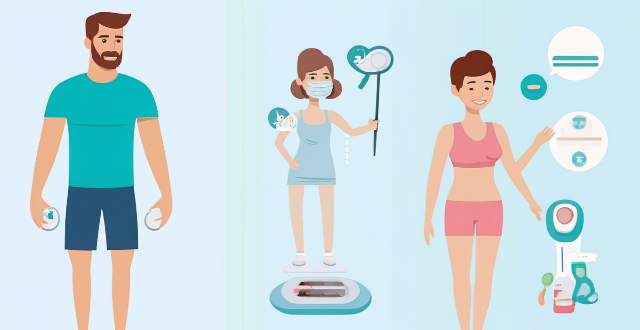Body fat percentage is an important indicator of overall health. It reflects the amount of body fat relative to lean muscle mass and can be used to assess risk factors for chronic diseases such as heart disease, diabetes, and cancer. High body fat percentage is associated with increased risk of cardiovascular disease, type 2 diabetes, and certain types of cancer. Excess body fat can lead to high blood pressure, high cholesterol levels, inflammation, insulin resistance, elevated glucose levels, and hormonal imbalances. By maintaining a healthy body weight and reducing excess body fat through regular exercise and a balanced diet, you may be able to reduce your risk of these chronic diseases and improve your overall health and well-being.

How does body fat percentage affect overall health?
Body fat percentage is an important indicator of overall health. It reflects the amount of body fat relative to lean muscle mass and can be used to assess risk factors for chronic diseases such as heart disease, diabetes, and cancer. Here's a breakdown of how body fat percentage affects overall health:
1. Cardiovascular Health
High body fat percentage is associated with increased risk of cardiovascular disease. Excess body fat can lead to high blood pressure, high cholesterol levels, and inflammation, which can damage arteries and increase the risk of heart attacks and strokes.
1.1 High Blood Pressure
Excess body fat can raise blood pressure by increasing the workload on the heart and reducing blood flow through smaller vessels. This can lead to hypertension, or high blood pressure, which is a major risk factor for heart disease and stroke.
1.2 High Cholesterol Levels
Body fat can also contribute to high cholesterol levels, which are a major risk factor for heart disease. Excess body fat produces more cholesterol than lean muscle tissue, leading to higher LDL (bad) cholesterol levels and lower HDL (good) cholesterol levels.
1.3 Inflammation
Chronic inflammation is another potential consequence of excess body fat. Fat cells produce pro-inflammatory chemicals that can damage arteries and promote plaque buildup, leading to atherosclerosis and heart disease.
2. Diabetes Risk
High body fat percentage is also associated with an increased risk of type 2 diabetes. Excess body fat can lead to insulin resistance, which is a condition in which the body's cells become less responsive to insulin, a hormone that helps regulate blood sugar levels. Over time, this can lead to diabetes.
2.1 Insulin Resistance
Insulin resistance occurs when the body's cells become less responsive to insulin, a hormone that helps regulate blood sugar levels. Excess body fat can lead to insulin resistance, which is a condition in which the body's cells become less responsive to insulin, a hormone that helps regulate blood sugar levels. Over time, this can lead to diabetes.
2.2 Glucose Levels
High body fat percentage can also contribute to elevated glucose levels, which are another risk factor for diabetes. Excess body fat can lead to insulin resistance, which is a condition in which the body's cells become less responsive to insulin, a hormone that helps regulate blood sugar levels. Over time, this can lead to diabetes.
3. Cancer Risk
Finally, high body fat percentage is associated with an increased risk of certain types of cancer, including breast cancer, colon cancer, and prostate cancer. Excess body fat can lead to chronic inflammation and hormonal imbalances, both of which have been linked to cancer development.
3.1 Inflammation
Chronic inflammation is another potential consequence of excess body fat. Fat cells produce pro-inflammatory chemicals that can damage DNA and promote tumor growth. This can lead to the development of cancerous tumors.
3.2 Hormonal Imbalances
Excess body fat can also contribute to hormonal imbalances, which are known risk factors for certain types of cancer. For example, estrogen has been linked to breast cancer development, while testosterone has been linked to prostate cancer development. By maintaining a healthy body weight, you may be able to reduce your risk of these types of cancers.